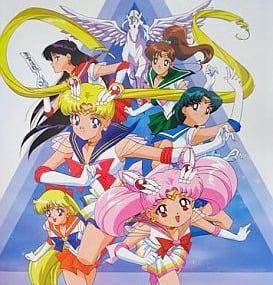

Michiru Kaioh means "Neptune Rising" ("michiru" means "rising", while "kai" and "o" mean "sea" and "king" and are derived from "kaiosei"-"Sea King Star" which describes Neptune), which alludes to her powers coming from the ocean.Setsuna Meioh is loosely translated as "Moment of Pluto", which alludes to her power over time ("setsuna" means "moment", while "mei" and "o" mean "dark" and "king" and are derived from "meiosei"-"Dark King Star" which describes Pluto).This pertains to Venus being the goddess of love. Minako Aino reads "Beautiful Child of Love" ("mi" means "beauty" and "ko" means child, while "ai" means "love").
 Makoto Kino translates as "Tree Spirit Makoto" ( "ki" means "tree" and "spirit"), and her power is control over nature (mostly trees/lightning). The word "rei" could be translated as "beautiful", "companion", "spirit", or "soul" (the latter fits her "Fire Soul" cry), but the name "Rei" is always written in Katakana, which suggests that it doesn't have any Japanese meaning. Rei Hino's surname relates to fire ("hi" means "fire"), which reveals her power to control fire. Ami Mizuno reads "Asian Beauty of Water" ("A" means "Asian" and "mi" means "beauty", while "mizu" means "water"), which reveals her power to control water. Chibiusa is a loose term of "little Usagi" ("chibi" means "little" or "mini"), she being Usagi's daughter and Sailor MINI-Moon. the name of Usagi Tsukino is loosely translated as "Rabbit of the Moon" ("usagi" means "rabbit", and "tsuki" means "moon").This pertains to a Japanese folktale about a rabbit that can be seen in the Moon, and also to her moon-based powers. The Sailor Senshi's civilian names relate to their superhuman roles:
Makoto Kino translates as "Tree Spirit Makoto" ( "ki" means "tree" and "spirit"), and her power is control over nature (mostly trees/lightning). The word "rei" could be translated as "beautiful", "companion", "spirit", or "soul" (the latter fits her "Fire Soul" cry), but the name "Rei" is always written in Katakana, which suggests that it doesn't have any Japanese meaning. Rei Hino's surname relates to fire ("hi" means "fire"), which reveals her power to control fire. Ami Mizuno reads "Asian Beauty of Water" ("A" means "Asian" and "mi" means "beauty", while "mizu" means "water"), which reveals her power to control water. Chibiusa is a loose term of "little Usagi" ("chibi" means "little" or "mini"), she being Usagi's daughter and Sailor MINI-Moon. the name of Usagi Tsukino is loosely translated as "Rabbit of the Moon" ("usagi" means "rabbit", and "tsuki" means "moon").This pertains to a Japanese folktale about a rabbit that can be seen in the Moon, and also to her moon-based powers. The Sailor Senshi's civilian names relate to their superhuman roles:






 0 kommentar(er)
0 kommentar(er)
